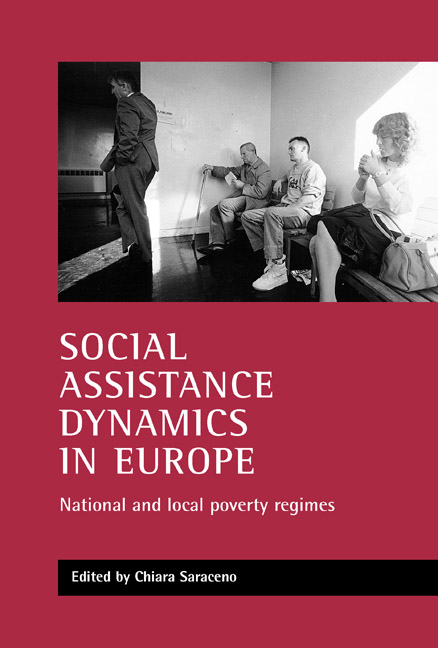Book contents
- Frontmatter
- Contents
- List of figures and tables
- Acknowledgements
- Notes on contributors
- one Introduction: exploring social assistance dynamics
- two Cities as local systems
- three Income support measures for the poor in European cities
- four Why some people are more likely to be on social assistance than others
- five Paths through (and out of) social assistance
- six Deconstructing the myth of welfare dependence
- References
- Appendix Institutional frameworks of income support policies in 13 European cities
- Index
three - Income support measures for the poor in European cities
Published online by Cambridge University Press: 20 January 2022
- Frontmatter
- Contents
- List of figures and tables
- Acknowledgements
- Notes on contributors
- one Introduction: exploring social assistance dynamics
- two Cities as local systems
- three Income support measures for the poor in European cities
- four Why some people are more likely to be on social assistance than others
- five Paths through (and out of) social assistance
- six Deconstructing the myth of welfare dependence
- References
- Appendix Institutional frameworks of income support policies in 13 European cities
- Index
Summary
Introduction
Within the framework outlined in Chapter Two, this chapter focuses in particular on the income support measures for the able-bodied poor adopted in the countries and cities examined. Our aim is twofold: firstly, to reconstruct in detail the mode of construction and implementation of the measures in order to understand their impact and significance for the life chances of beneficiaries; and secondly, to develop a basis for comparison, allowing us to go beyond the specific features of each case study and integrate them within a more general picture.
In order to do this, we need to take into account the multiple dimensions and levels involved in the actual implementation of a programme. These include the selection of the beneficiaries, the perspectives and options offered by the programme to those involved and its consequent social significance. The only way to understand the effective range of a measure and its impact on poverty is, in fact, to reconstruct the whole set of regulations applied in the social treatment of poverty. Three levels of contextualisation are crucial.
The first, and most obvious one, has already been dealt with in Chapter Two. It concerns the socioeconomic and social-demographic background within which the measures are developed and implemented. This plays a decisive role, most notably in the employment prospects offered and the selection of beneficiaries. With respect to the dimensions mentioned above, it contributes to the definition of the profile and the image of those affected by income support measures. The profile will differ considerably according to the dominant forms of economic activity, whether the city is flourishing or in decline, the structure of the population by age-group, the importance of immigration, the attractiveness of the city for surrounding populations, and so on. At the same time, the economic conditions shape the perspectives and options open to the actors. The accompanying programmes included in the various systems of social protection – including training courses, funded job schemes, and so on – obviously cannot be isolated from the employment situation specific to the local context, that is the level of unemployment, types of job skill in demand, wage levels, the possibility of working part-time, and so on. The strategies developed by the beneficiaries of income support programmes, and the way that they experience their situation, will depend on the distribution of poverty and the employment prospects of the city concerned.
- Type
- Chapter
- Information
- Social Assistance Dynamics in EuropeNational and Local Poverty Regimes, pp. 81 - 126Publisher: Bristol University PressPrint publication year: 2002
- 1
- Cited by

